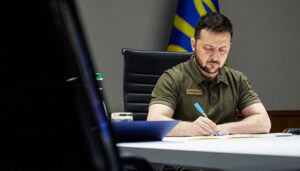
Ukrainian President Vladimir Zelensky has imposed sanctions against the daughter of former Defense Minister Lebedev, head of the Frunze NGO Volodymyr Lukyanenko and his son, former MP Andriy Derkach, and the nominal owners of the VS Energy energy company. This is stated in a presidential decree published Friday evening.
In addition, sanctions have been imposed against the son of prominent Russian businessman Vadim Giner, Olga and Irina Babakov
“Another sanctions package to date. With his decree, he imposed restrictive measures on the property of Russian companies in Ukraine and the property of related Ukrainian economic entities,” Ukrainian President Vladimir Zelensky wrote in his Telegram channel on Friday.
“Even critical infrastructure facilities and key strategic enterprises were sometimes under their control. Today we are overcoming these risks. The sanctions are also imposed on companies associated with Medvedchuk and other subsanctioned individuals, the founders, managers, beneficiaries of pro-Russian companies with significant assets in Ukraine,” the president said.
Ukrainian President Vladimir Zelensky has imposed sanctions against the daughter of former Defense Minister Lebedev, the head of the Frunze NGO Volodymyr Lukyanenko and his son, former MP Andriy Derkach, and the nominal owners of the VS Energy energy company. This is stated in a presidential decree published Friday evening.
In addition, sanctions have been imposed against the son of prominent Russian businessman Vadim Giner, Olga and Irina Babakov
“Another sanctions package to date. With his decree, he imposed restrictive measures on the property of Russian companies in Ukraine and the property of related Ukrainian economic entities,” Ukrainian President Vladimir Zelensky wrote in his Telegram channel on Friday.
“Even critical infrastructure facilities and key strategic enterprises were sometimes under their control. Today we are overcoming these risks. The sanctions are also imposed on companies associated with Medvedchuk and other subsanctioned persons, the founders, managers, beneficiaries of pro-Russian companies with significant assets in Ukraine,” the president said.
Source: Decree of the President of Ukraine No. 279/2023 – Official web representation of the President of Ukraine (president.gov.ua)
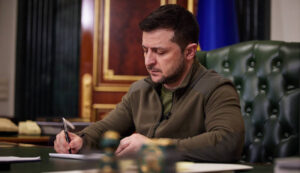
Ukrainian President Vladimir Zelensky has signed decrees on several sanctions packages, including Zaporizhstal.
“Today is sanctions day. There are several sanctions packages, the relevant decrees have been signed. The first sanctions package is in relation to Zaporizhstal. With his decree imposed restrictive measures on 41 persons – 13 individuals and 28 legal entities – with which the Russian Federation maintained control over the enterprise, harmed our economy,” he wrote in the telegram channel.
“We start the procedure for the confiscation of the Russian part – it will work for Ukraine and Ukrainians,” Zelensky added.
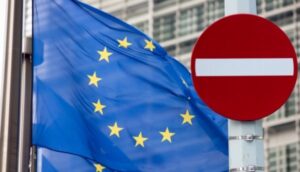
The EU is considering imposing sanctions against dozens of companies from China, Iran, Kazakhstan and Uzbekistan that cooperate with Russia, Reuters reports.
The agency cites diplomatic sources familiar with the European Commission’s draft proposals. Inclusion of these companies in the “black list” is possible within the framework of the prepared 11 package of anti-Russian sanctions.
In late April, Assistant Secretary of the U.S. Treasury Elizabeth Rosenberg during a visit to Kazakhstan warned of the growing risks of secondary sanctions against Kazakh companies and banks that help Russia evade Western sanctions imposed in response to the full-scale war against Ukraine unleashed by Russia.
CHINA, EU, IRAN, KAZAKHSTAN, SANCTIONS, UZBEKISTAN
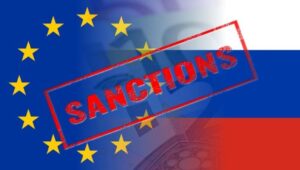
Trade between the European Union and Russia has fallen significantly since Russia’s invasion of Ukraine, especially noticeably in recent months, the EU statistics office (Eurostat) reported Friday.
Russia’s share of EU imports fell to 4.3 percent from 9.5 percent between February and December 2022, according to the statistical data. During the same period, Russia’s share of EU exports fell to 2 percent from 4 percent.
The EU’s trade deficit with Russia peaked at €18.2 billion in March 2022 and then gradually declined to €6.0 billion in December 2022. The value of imports from Russia during this period fell 53% to €10.3 billion from €21.8 billion.
Eurostat notes that “as Russia gradually replaced other trading partners, its share of EU imports fell across six key commodities. Among them, the largest drop was recorded for coal (to 22% in 2022 from 45% a year earlier), natural gas (to 21% from 36%), fertilizers (to 22% from 29%), iron and steel (to 10% from 16%).
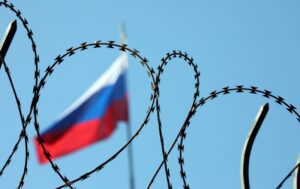
The European Union on Saturday, February 25, enacted the tenth package of sanctions against Russia, the EU press service said.
“The Council decided to introduce restrictive measures against 87 more individuals and 34 legal entities,” the text of the communiqué reads.
The list of restrictive measures includes Russian officials, military leaders, propagandists and, among others, the former general director of Motor Sich, Vyacheslav Boguslayev. He is on trial in Ukraine for treason.
In particular, the sanctions will affect such organizations as Alfa Bank, Rosbank and Tinkoff Bank, Commercial Automobiles – GAZ Group LLC, a number of Rosatom companies, Patriot media group, National Reinsurance Company, and Yevgeny Primakov, head of Rossotrudnichestvo, Russian Human Rights Commissioner Tatyana Moskalkova, Deputy Head of Moscow Region Government Vyacheslav Dukhin for deportation of Ukrainian children to Russia, surgeon Leonid Roshal, head of Russian Presidential Council for Civil Society and Human Rights Valery Fadeev, Rosatomflot enterprise, which operates the Russian nuclear icebreaker fleet, the Russian Defense Ministry, the Russian Foreign Intelligence Service, Kirill Kleimenov, Deputy General Director of Channel One, Alexander Akopov, Deputy General Director of National Media Group, and military commander Alexei Avdeev, Mikhail Teplinsky, military commander, Sergei Karakaev, Rossiya Segodnya media group and executive director Kirill Vyshinsky, Rossiya 24 chief executive Yevgeny Bekasov, Literaturnaya Gazeta chief executive Maxim Zamshev, Regnum agency chief Marina Akhmedova, and Sputnik news agency.
The sanctions also affected four Iranian citizens, including the managing director of the aerospace company Qods Aviation Industry.
The sanctions include an asset freeze, a ban on entry and transit through EU countries and a ban on citizens and companies in the EU providing funds to them.
“We will continue to increase the pressure on Russia for as long as necessary,” said Josep Borrell, head of EU diplomacy.
Source
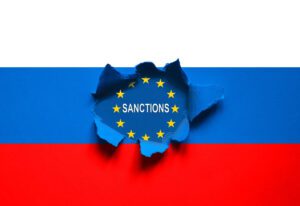
The Swedish presidency of the European Council officially announces the adoption of the tenth package of sanctions for Russia.
“A year has passed since Russia’s brutal and illegal invasion of Ukraine. Today the EU approved the 10th package of sanctions against Russia,” the presidency’s official Twitter page said.
It specifies that the package includes, for example, tougher export restrictions on dual-use and technology, targeted restrictive measures against individuals and entities that support the war, spread propaganda or deliver drones used by Russia in the war, and measures against Russian disinformation.
“Together, EU member states have imposed the most decisive and far-reaching sanctions in history to help Ukraine win the war. The EU is one with Ukraine and the Ukrainian people. We will support Ukraine for as long as it takes,” it said.